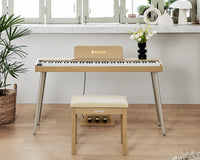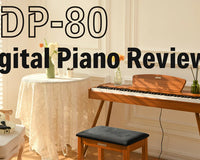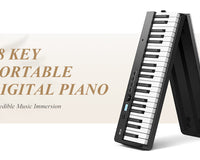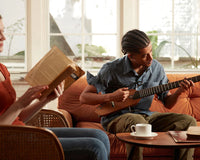The holidays are coming soon ! And no, we are not talking about summer shopping, but family reunions, parties with friends and school shows. Imagine how much fun it could be to play a little piece of piano on it!

For those who already know how to play the piano, all that remains is to find the right moment. For those who do not yet know how to play the piano, the most important thing is to find the time to learn! Can you learn to play the piano in less than 3 months?
The answer is yes ! There is a multitude of small tutorials to learn piano online. All you have to do is subscribe and get your hands on your instrument. But besides, what is the best piano for beginners?

If you are wondering what is the best option for beginners between acoustic or digital pianos, the answer is simple: they are digital pianos. They are cheaper, more compact, have more options, educational tools and are easier to maintain.
In our previous articles, we talked about the difference between acoustic and digital piano. A little reminder: you can buy a digital piano in a price range of 300€ and 600€. While the price of an acoustic piano will be more around 1,000€.
Acoustic pianos are particularly imposing, up to 150 cm long for large pianos. While a keyboard, or digital piano, without its feet, can easily fit on your dining table / desk. If the space in your room allows it, you can even afford to have an upright digital piano, which is, and very practical, and decorative.
The most significant advantage placing digital pianos above acoustic pianos is: their many options and features. You can easily activate the educational mode, the "split" (division of the keyboard in two) and the instant replay mode, among many other features to accompany you throughout your learning. We will talk about it in more detail later.
As you probably already know, an acoustic piano needs to be tuned regularly. While an acoustic piano requires the intervention of a professional, a digital piano stays in tune all the time, and if you want to change the tuning, most of them have a feature to change the octaves, and some applications on the phone allow it too. It's much simpler and faster.
Now that you know that the digital piano is the best option for beginners, what type of digital piano will suit you best?
What to Check When Choosing a Digital Piano?
If you are a beginner and you do not yet know what points to consider when deciding which digital piano to buy, here we present some features, options and characteristics that may help you in your final decision.
Tone and Polyphonic Capacity
A digital or electronic piano, as mentioned earlier in our articles, works with sampling technology: the sounds produced by the piano are sound samples recorded from a real acoustic instrument. The quality of its tones and its polyphony will therefore depend on the extent of its library of recordings: the larger and more complete it is, the more the notes will be subtle and precise.
The digital piano Give DEP-20 has 238 tones and 128 polyphony. It is comparable to its acoustic counterpart at €1,000.
Educational Modes
The first thing you will do with a digital piano is probably learn to play it! Whether you ask a private teacher or simply an experienced relative, you can benefit from the "split" function of the keyboard. This mode consists of separating the keyboard into two distinct and independent parts with the same notes and tones, as if you were each playing on a separate keyboard! This mode is therefore easier and very practical for learning with two people on the same keyboard.

So you can follow your teacher's lead simultaneously and compare your melodies. This method can greatly help you in your learning progress.
88 Key Keyboards Heavy Touch
Why 88 keys? Because it is the number of keys of an acoustic piano keyboard. The advantage of a heavy/weighted touch keyboard is that it reproduces the feeling of playing on an acoustic piano. It is therefore perfect for beginners to start learning on a digital piano and benefit from all its features, without being disoriented when you want to play on an acoustic piano afterwards.

Although there are keyboards with 61 or even 54 keys, portable and very practical, 88-key keyboards are perfect for learning the basics and even performing more complex melodies. The keyboard is complete and identical to that of an acoustic piano. It is ideal for classical learning.
Just as we recommend an 88-key piano, the heavy touch, or “weighted keys,” mimics the playing feel of an acoustic piano keyboard under the tension of hammer action.
In summary, to best prepare you for a change between electronic keyboard and acoustic keyboard, the best way to adapt is to start practicing on 88-key heavy touch keyboard.
Price range
Admit it, whether it's you or your child who wants to learn to play the piano, dropouts are frequent... It is therefore not necessary to spend a fortune on it until the passion has taken its torch. Anyway, all the features and benefits mentioned above can be acquired in a digital piano for well under $1,000.
The most recommended digital piano to start learning to play the piano is the Donner DEP-20. It benefits from all these advantages at only €342.54 and sometimes even less during promotional campaigns, with free delivery!
It has 25W stereo speakers and is suitable for MP3 backing track playback.
And even if you are not familiar with the control panel, thanks to its backlit screen, the settings become intuitive.
It benefits from great connectivity, thanks to all its ports on the back, you can connect it to many USB devices, pedals, headphones, and many more, for more diversified performance!
With all these features, the DEP-20 Donner is the first choice 88-key keyboard under 500€!




























